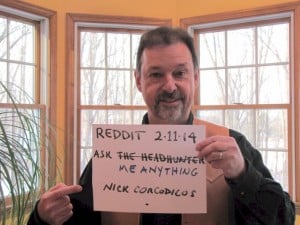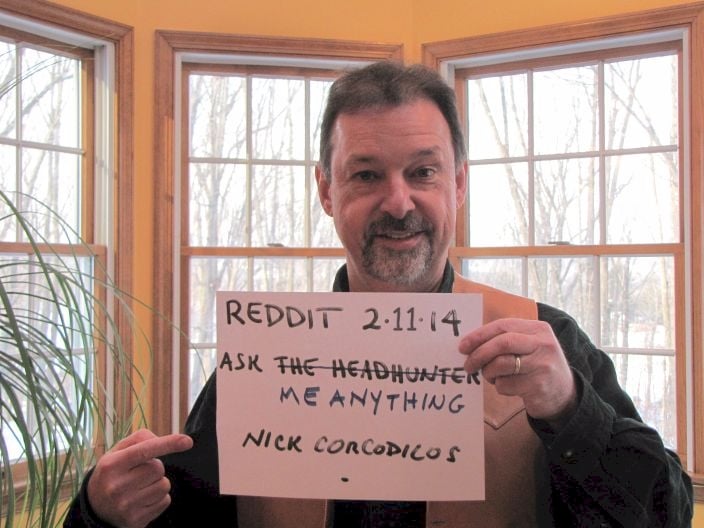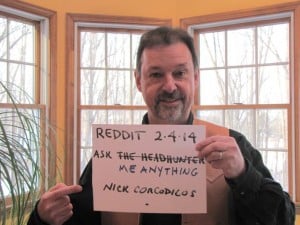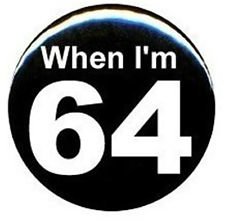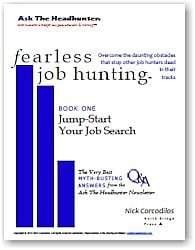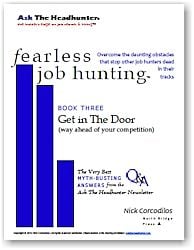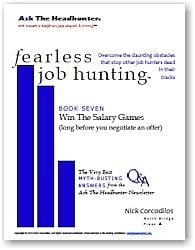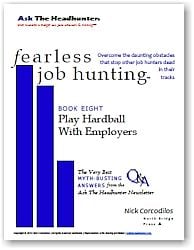In the December 17, 2013 Ask The Headhunter Newsletter, a reader asks for the short and sweet version of Ask The headhunter (and gets an earful):
Can you please summarize the Ask The Headhunter strategy and explain the main differences between ATH and the traditional approach to job hunting? Thanks.
Nick’s Reply
 This is a good end-of-year question. The detailed answer is spread across the website, my blog, these newsletters and my PDF books. But I’ll try to summarize by sharing some of my tips, in the form of reprints straight from the books.
This is a good end-of-year question. The detailed answer is spread across the website, my blog, these newsletters and my PDF books. But I’ll try to summarize by sharing some of my tips, in the form of reprints straight from the books.
I’ve selected sections that should be helpful by themselves, and I hope they get you off on the right foot. If you’d like more details that are beyond the scope of the newsletter, please check the PDF books they come from.
Here’s Ask The Headhunter in a nutshell:
Find the right job
1. The best way to find a good job opportunity is to go hang out with people who do the work you want to do — people who are very good at it. Insiders are the first to know about good opportunities, but they only tell other insiders.
To get into an inside circle of people, you must earn your way. It takes time. You can’t fake it, and that’s good, because who wants to promote (or hire) the unknown? Here’s how the distinction works.
From How Can I Change Careers?, pp. 27-28, “A Good Network Is A Circle of Friends”:
Don’t speculate for a job
The way most people network for a job smacks of day trading in the stock market. The networker has no interest in the people or companies she’s “investing” in. She just wants a quick profit. She skims the surface of an industry or profession, trying to find easy contacts that might pay off quickly.
When you encounter an opportunistic networker, you’ll find that she listens carefully to the useful information you give her, but once you’re done helping, she’s not interested in you any more. She might drop some tidbits your way, but don’t expect her to remember you next week.
Invest in relationships
Contrast this to someone who reads about your company and calls to discuss how you applied new methods to produce new results. She’s interested in your work and stays in touch with you, perhaps sending an article about a related topic after you’ve talked. She’s investing in a potentially valuable relationship.
This initial contact might prompt you one day to call your newfound friend for advice, or to visit her company’s booth at the next trade show and introduce yourself. Maybe it never goes beyond that or maybe one day you’ll work together. The point is, after a time you become familiar to one another. You become members of one another’s circle. You’ll help one another because you’re friends, not “because it will pay off later.”
The methods in How Can I Change Careers? are not just for career changers — they are for anyone changing jobs that wants to stand out to a hiring manager as the profitable hire.
Get the interview
2. The best way to get a job interview is to be referred by someone the manager trusts. Between 40-70% of jobs are filled that way. Yet people and employers fail to capitalize on this simple employment channel. They pretend there’s some better system — like job boards. That’s bunk. There is nothing more powerful than a respected peer putting her good name on the line to recommend you. Deals close faster when the quality of information is high and the source of information is trusted. That’s why it takes forever to get a response when you apply “blind” to a job posting.
How can you get interviews via the insiders who have the power to recommend you? I once gave some advice to a U.S. Army veteran who had just returned home from overseas duty and wanted to start a career in the home building industry. This method works in virtually any line of work.
From Fearless Job Hunting – Book 3: Get In The Door (way ahead of your competition), pp. 15-16, “How to make great personal contacts”:
Pick the two or three best builders in your area; ones you’d really like to work for. They may not be the biggest, but they should be the ones you have a real affinity for. Find out who finances their projects. This is pretty easy — the name of the bank is often posted at the work site.
Then go visit the bank. Ask which vice president handles the relationship with your target company. Then sit down and explain that you are evaluating various companies in your town because you want to make a career investment… After you make your brief statement, let the banker talk. You will get a picture of the entire building industry in your area. Your goal, at the end of the meeting, is to make a judgment about which companies are the best. Ask the banker if he could recommend someone for you to talk with at each company. Then, ask permission to use his name when you contact them. This is how you pursue companies rather than just jobs.
So, don’t just send a resume. Figure out who the company’s customers, vendors, consultants and bankers are — and talk to them. It’s how smart business people do smart business with a company: by talking to people that the company trusts.
Stand and deliver
3. The best way to do well in an interview is to walk in and demonstrate to the manager how you will do the job profitably for him and for you. Everything else is stuff, nonsense and a bureaucratic waste of time. Don’t believe me? Ask any good manager, “Would you rather talk to 10 job applicants, or meet just one person who explains how she will boost your company’s profitability?” I have no doubt what the answer is.
The idea of showing how you’ll pay off to an employer intimidates some people. But it’s really simple, once you get out of the mindset of the job applicant and start thinking like a business person.
From Fearless Job Hunting – Book 6: The Interview: Be The Profitable Hire,
pp. 8-9, “How can I demonstrate my value?”
Estimate your impact to the bottom line If the work you do is overhead and mostly affects costs: Do you shave two minutes off each customer service call you handle? Have you figured out a way to get projects done 20% faster? Multiply this by the hourly wage or by the salary. The savings are just one part of the profit you contribute. Get the idea? I’m simplifying, but few of your competitors will offer any estimates at all. This gives you a good, honest story to tell the employer about how you will contribute to the success of the business. It gives you an edge.
If the job affects revenue, try to quantify the impact. Your estimate may not be accurate, simply because you don’t have all the relevant information at your fingertips, but you must be able to defend your calculations. Run it by someone you trust who knows the business, then present it to your boss or to your prospective boss. You can even present your estimates in the interview, and ask the employer how you might make them more accurate. This can be a very effective ice breaker.
If you can’t demonstrate how you will contribute to the bottom line, then be honest with yourself: Why should the employer hire you? Or, why should your employer keep you?
Employers don’t pay for interview skills. They pay for your work skills. The rare job candidate is ready to discuss how he or she will do the job profitably. That’s who stands out, and it’s who gets hired.
Profit from headhunters
4. The best way to get a headhunter’s help is to manage your interaction for mutual profit from the start. Hang up on the unsavory charlatans and work only with headhunters who treat you with respect from the start.
If you’re not sure how to qualify a headhunter, when the headhunter calls you, here’s how to say it:
From How to Work with Headhunters… and how to make headhunters work for you, p. 30, one of 34 How to Say It tips:
How to Say It
“If we work together, you will check my references and learn a lot about me so you can judge me. But likewise, I need to know about you, too. I’d be putting my career in your hands. Would you please share a few references? I will of course keep the names you provide confidential, just as I expect you will keep the names I give you.”
Don’t waste time with headhunters who don’t demonstrate high standards of behavior. Sharing references is test #1.
Then, instead of “pitching” yourself to the headhunter, be still and listen patiently to understand the headhunter’s objective. Proceed only if you really believe you’re a match. Then show why you’re the headhunter’s #1 candidate by outlining how you will do the job profitably for his client. Headhunters adopt candidates who make the headhunter’s job easier, and who help the headhunter fill the assignment quickly. (Coda: If you follow suggestions 1-3 carefully, you won’t need to rely on a headhunter. But if you’re lucky enough to be recruited, you need to know How to Work with Headhunters.)
That’s Ask The Headhunter in a nutshell.
Why ATH works
You ask what is the main difference between ATH and the traditional approach. It’s pretty simple. The traditional approach is “shotgun.” You blast away at companies with your resume and wait to hear from someone you don’t know who doesn’t know you. Lotsa luck. (ATH regulars know that I never actually wish anyone luck, because I don’t believe in it. I believe in doing the work required to succeed.)
ATH is a carefully targeted approach. You must select the companies and jobs you want. It takes a lot of preparation to accomplish the simple task in item (3). There are no shortcuts. No one can do it for you. If you aren’t prepared to do it right, then you have no business applying for the job, and the manager would be a fool to hire you.
How to be the stand-out candidate
I’ll leave you with a scenario that illustrates why the traditional methods don’t work well. You walk up to a manager. You hand him your resume — your credentials, your experience, your accomplishments, your keywords, your carefully crafted “marketing piece.” Now, what are you really saying to that manager?
“Here. Read this. Then you go figure out what the heck to do with me.”
Managers stink at figuring that out. You have to explain it to them, if you expect to stand out and to get hired. Do you really expect someone to decipher your resume and figure out what to do with you? America’s entire employment system fails you every day because it’s based on that passive mindset.
The job candidate who uses the Ask The Headhunter approach keeps the resume in her pocket and says to the manager, “Let me show you what I’m going to do to make your business more successful and more profitable.” Then she outlines her plan — without giving away too much.
That’s who you’re competing with, whether she learned this approach from me or whether it’s just her common sense. Long-time ATH subscriber Ray Stoddard puts it like this:
“The great news about your recommendations is that they work.
The good news for those of us who use them is that few people are really willing
to implement what you recommend, giving those of us who do an edge.”
I hope Ask The Headhunter helped you get an edge in 2013. We will continue to discuss the details of the methods outlined here in upcoming issues of this newsletter. Meanwhile, here’s wishing everyone a very Merry Christmas, Happy Holidays (no matter what you celebrate or where you celebrate it), and a Happy, Healthy, and Prosperous New Year!
(Please note: I’m taking a couple of weeks off for Christmas and New Year’s, so there will be no newsletters those two weeks. See you with the next edition on January 7!)
How have you used the ATH methods to land the job you want, or to hire exceptional employees? What other methods of your own have worked well for you? (Did anything you did shock, awe or surprise an employer?)
: :
 Question: I’m considering leaving my company. I’ve been pretty happy here and the company has been good to me. Now there are some good opportunities I’ve learned about that would pay better. But I’m worried about “the grass is always greener” effect. That is, my current company and job might in fact be the best thing for me. How do I go about evaluating what I’ve got here?
Question: I’m considering leaving my company. I’ve been pretty happy here and the company has been good to me. Now there are some good opportunities I’ve learned about that would pay better. But I’m worried about “the grass is always greener” effect. That is, my current company and job might in fact be the best thing for me. How do I go about evaluating what I’ve got here?

